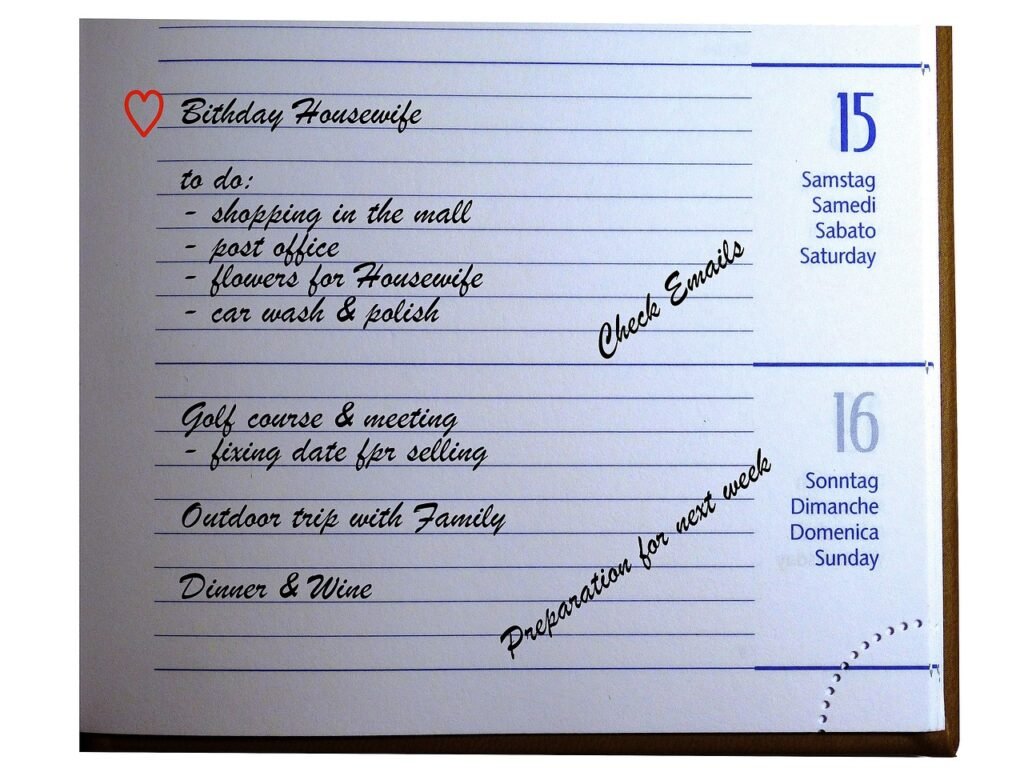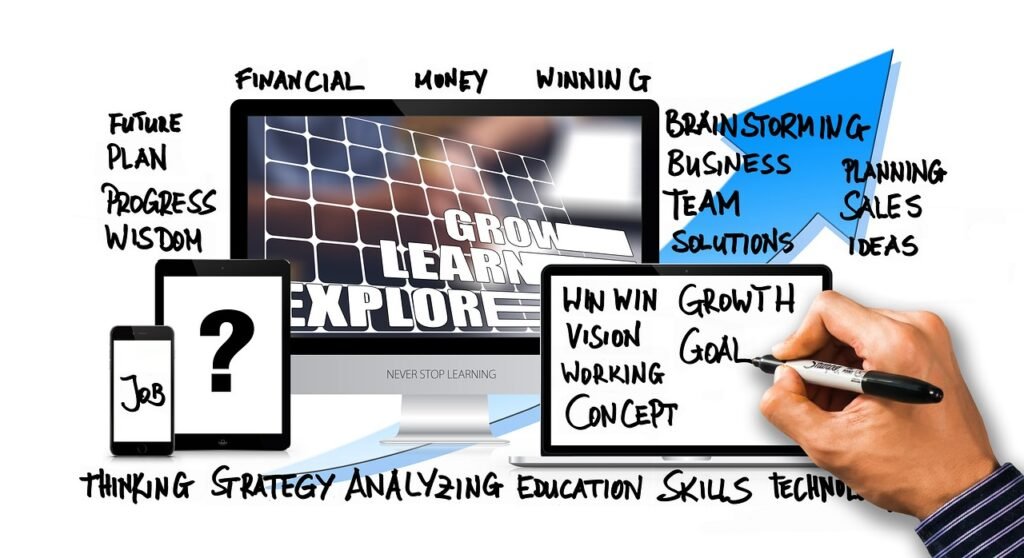
Introduction to Personal Growth

Embarking on the path of self-improvement can seem daunting, yet it’s one of the most fulfilling pursuits you can undertake.
The concept of personal growth revolves around the continuous effort to better oneself in various aspects of life.
Whether it’s learning new skills, adopting healthier habits, or becoming more mindful of your actions and thoughts, the aim is to make consistent, incremental changes that add up over time.
Personal growth isn’t about making grand, sweeping changes overnight.
It’s about integrating small, manageable habits into your daily routine that collectively lead to significant improvement.
This approach ensures that the process is sustainable and less overwhelming, making it easier to maintain your commitment over the long term.
For instance, consider the impact of dedicating just a few minutes each morning to planning your day.
This simple habit can set a positive tone and provide a clear direction for the hours ahead.
Similarly, taking a short walk or engaging in light exercise can energize both your body and mind, preparing you for a productive day.
Another effective habit is practicing gratitude.
Spend a moment each day to reflect on what you’re thankful for, whether it’s a supportive friend, a recent accomplishment, or even the beauty of a sunny day.
This practice can shift your focus from what’s lacking in your life to what you already have, fostering a more positive outlook.
Reading regularly is another powerful tool for self-improvement.
Whether it’s a book, article, or blog post, reading expands your knowledge and broadens your perspectives.
It can introduce you to new ideas, enhance your understanding of various topics, and stimulate your intellectual curiosity.
Additionally, the practice of mindfulness can help you become more aware of your thoughts and actions.
By dedicating a few minutes each day to meditation or simply sitting quietly, you can develop a greater sense of inner peace and mental clarity.
By weaving these habits into the fabric of your daily life, you can gradually transform your approach to personal growth.
Morning Habits for Enhanced Productivity

The way you start your morning can set the tone for the rest of your day.
One effective strategy is to wake up early, giving yourself the gift of time to prepare for the day ahead.
Despite this, many people find themselves spending only a short amount of time in the morning for preparation; in fact, 56% of people spend between 11 and 30 minutes getting ready for their day.
One habit to break is immediately checking your phone upon waking.
Instead, consider incorporating morning exercise to boost your energy levels.
Exercise not only revitalizes your body but also primes your mind for increased productivity throughout the day.
Starting your morning with a nutritious breakfast can also greatly impact your productivity.
Despite the benefits of a good breakfast, there has been a notable trend towards skipping this meal, with more than 55% of people choosing to forego breakfast in 2022 compared to 28% in 2018.
By making a conscious effort to start your day with a nutritious meal, you can set a positive tone for the hours to follow.
Another valuable habit to integrate into your morning routine is setting clear goals for the day.
Dedicating a few minutes to plan your tasks can provide a sense of direction and help you prioritize what needs to be accomplished.
This small step can make your day feel more organized and less chaotic.
Lastly, incorporating mindfulness practices such as a brief meditation session can be highly beneficial.
Even just five to ten minutes of focused breathing or meditation can clear your mind and set a calm, centered tone for the day ahead.
Mindfulness and Meditation Practices

Mindfulness and meditation can be powerful tools for reducing stress and enhancing mental clarity.
Many people have already integrated these practices into their daily routines, with 63% of respondents reporting that they meditate or engage in some form of yoga.
Daily meditation doesn’t require a significant time commitment.
Begin with five to ten minutes a day, focusing on your breath and clearing your mind of clutter.
Over time, you’ll likely notice an increase in mental clarity and a decrease in stress levels.
Mindfulness can be practiced in various ways. One approach is to be fully present during daily activities.
Whether you’re eating, walking, or even washing dishes, try to focus entirely on the experience.
Notice the textures, smells, and sounds around you.
This helps anchor you in the present moment and reduces anxiety about future tasks or past events.
Another effective mindfulness exercise is body scanning.
This involves lying down and mentally scanning each part of your body, starting from your toes and moving up to your head.
Pay attention to any tension or discomfort, and try to release it.
This practice promotes a deep sense of relaxation and awareness.
Breathing exercises are also a core element of mindfulness.
One simple technique is to inhale deeply through your nose, hold for a few seconds, and exhale slowly through your mouth.
Repeat this cycle several times. This not only calms your mind but also helps regulate your body’s stress response.
Guided meditation apps and videos can be helpful for beginners.
These resources offer structured sessions that guide you through various mindfulness and meditation techniques, making it easier to get started.
Consistency is key to reaping the benefits of mindfulness and meditation.
By making these practices a regular part of your routine, you can cultivate a more peaceful and focused state of mind, ultimately contributing to your overall well-being.
Lifelong Learning and Skill Acquisition

Lifelong learning is a key component of self-improvement.
Continuously expanding your knowledge and acquiring new skills not only keep your mind sharp but also open up new opportunities in both personal and professional realms.
One accessible and effective way to engage in lifelong learning is through reading.
Whether you prefer books, articles, or blogs, reading exposes you to new ideas, different perspectives, and valuable information that can broaden your understanding of the world.
Another powerful method for skill acquisition is enrolling in online courses.
The internet is a rich resource for education, offering a wide range of subjects from coding and graphic design to languages and business management.
Websites like Coursera, Udemy, and Khan Academy provide high-quality courses that you can take at your own pace, making it easier to fit learning into your busy schedule.
Podcasts and webinars are also excellent tools for lifelong learning.
They allow you to absorb new information while on the go, whether you’re commuting, exercising, or doing household chores.
Many industry experts and thought leaders share their knowledge through these platforms, giving you access to cutting-edge insights and practical advice.
Participating in workshops and seminars can further enhance your skill set.
These events often provide hands-on experience and the opportunity to network with like-minded individuals, fostering a community of learning and support.
Additionally, joining professional organizations related to your field can offer ongoing educational resources and networking opportunities.
Don’t underestimate the value of learning from others.
Mentorship can be incredibly beneficial for personal and professional growth.
Seek out mentors who can offer guidance, share their experiences, and provide constructive feedback.
Similarly, teaching others can solidify your own understanding and reveal areas where you can improve.
Lastly, practical experience is crucial for skill acquisition.
Apply what you’ve learned in real-world scenarios, whether through projects, volunteering, or internships.
This hands-on approach not only reinforces your knowledge but also helps you develop confidence in your abilities.
Incorporating these diverse learning strategies into your routine can significantly contribute to your journey of self-improvement, ensuring that you are always growing and evolving.
Setting and Achieving Effective Goals

Setting goals is crucial for self-improvement, but it’s important to approach them strategically.
Using the SMART criteria—Specific, Measurable, Achievable, Relevant, and Time-bound—can help you set clear and attainable objectives.
Regularly reviewing and adjusting your goals ensures that you stay on track and make progress towards your desired outcomes.
To achieve your goals, break them down into smaller, manageable tasks.
This approach not only makes large goals seem less overwhelming but also provides a sense of accomplishment as you complete each step.
For example, if your goal is to read more books, start by setting a target to read for 10 minutes each day.
Gradually increase this time as it becomes a part of your routine.
Accountability can play a significant role in helping you achieve your goals.
Sharing your objectives with a friend or family member can provide external motivation and support.
You might even consider forming a group with people who have similar goals, where you can share progress and challenges.
Another useful strategy is to visualize your goals.
Creating a vision board or writing down your goals in a journal can make them feel more tangible and achievable.
Refer to these visual aids regularly to keep your motivation high.
It’s also essential to celebrate your progress along the way.
Recognize and reward yourself for small milestones, as these moments of acknowledgment can boost your motivation and reinforce positive habits.
Whether it’s treating yourself to something special or simply taking a moment to reflect on your achievements, these small celebrations can make the journey more enjoyable.
Remember, setbacks are a natural part of the process.
Instead of viewing them as failures, consider them learning opportunities.
Reflect on what went wrong and how you can adjust your approach moving forward.
Flexibility and resilience are key to staying committed to your goals despite challenges.
By integrating these strategies into your goal-setting process, you’ll find it easier to stay focused and motivated, ultimately leading to greater success in your self-improvement journey.
Making Healthy Lifestyle Choices

Healthy lifestyle choices are foundational to both physical and mental well-being.
Start by ensuring your diet is balanced and nutritious, as the foods you consume have a direct impact on your energy levels and mood.
Don’t overlook the importance of staying hydrated, as drinking water in the morning can improve both mood and cognitive function.
Another key aspect of a healthy lifestyle is regular physical activity.
Exercise doesn’t have to be intense to be effective.
Even moderate activities like walking, cycling, or yoga can have significant benefits for your physical health and mental clarity.
Aim to incorporate some form of movement into your daily routine, whether it’s a short walk during your lunch break or a quick workout session at home.
Getting enough sleep is equally important for maintaining overall health.
Quality sleep can enhance your cognitive function, mood, and physical health.
Strive for 7-9 hours of sleep each night and establish a regular sleep schedule to help regulate your body’s internal clock.
Stress management is another crucial component of a healthy lifestyle.
Chronic stress can take a toll on your physical and mental health, so it’s important to find effective ways to manage it.
Techniques such as deep breathing exercises, mindfulness practices, and engaging in hobbies you enjoy can help alleviate stress and promote relaxation.
Additionally, fostering social connections can contribute to a healthier lifestyle.
Surrounding yourself with supportive friends and family can provide emotional support and improve your overall well-being.
Make time to connect with loved ones, whether it’s through a phone call, a meal together, or a shared activity.
Despite the benefits of a good breakfast, there has been a notable trend towards skipping this meal, with more than 55% of people choosing to forego breakfast in 2022 compared to 28% in 2018.
By making a conscious effort to start your day with a nutritious meal, you can set a positive tone for the hours to follow.
Fostering Positive Relationships

Fostering positive relationships is essential for personal growth.
The connections we maintain can greatly influence our overall well-being and motivation.
One of the most effective ways to nurture these relationships is by practicing active listening.
This means fully engaging in conversations, maintaining eye contact, and showing genuine interest in what the other person is saying.
By doing so, you demonstrate that you value their thoughts and perspectives, which can deepen your bond.
Another key aspect of fostering positive relationships is offering support and encouragement.
Whether it’s celebrating achievements, offering a listening ear during tough times, or providing constructive feedback, your support can significantly impact the well-being of those around you.
Simple acts of kindness, such as sending a thoughtful message or helping out with a task, can go a long way in strengthening your relationships.
Communication is crucial in any relationship.
Be open and honest with your feelings and expectations, and encourage others to do the same.
This openness creates a foundation of trust and mutual respect, making it easier to resolve conflicts and misunderstandings.
When disagreements arise, approach them with a calm and empathetic mindset.
Instead of focusing on who’s right or wrong, try to understand the other person’s point of view and find a solution that works for both parties.
Setting healthy boundaries is also important in maintaining positive relationships.
It’s okay to say no when you need to and to communicate your limits clearly.
This ensures that your relationships are balanced and respectful, preventing feelings of resentment or burnout.
Lastly, make an effort to spend quality time with the people who matter to you.
Shared experiences and activities can strengthen your connection and create lasting memories.
Whether it’s a weekly catch-up call, a group outing, or simply enjoying a meal together, these moments of togetherness are invaluable.
By prioritizing these practices, you can cultivate relationships that are supportive, enriching, and conducive to your personal growth.
Conclusion and Motivation

Self-improvement is a dynamic process, and it’s important to celebrate your progress along the way.
Embrace the small victories, as they accumulate over time to create meaningful change.
The habits we’ve discussed—whether it’s dedicating a few minutes each morning to planning your day, engaging in regular physical activity, practicing mindfulness, or setting clear goals—are all stepping stones on your path to becoming a better person.
Remember, it’s not about making radical changes overnight.
Instead, focus on integrating manageable habits into your daily routine.
These small adjustments can have a significant impact on your overall well-being and productivity.
Whether you’re starting your day with a nutritious breakfast, taking time to meditate, or committing to lifelong learning, each positive action contributes to your growth.
It’s also crucial to manage the influence that others have on your life.
Surround yourself with supportive individuals who encourage your self-improvement journey.
Positive relationships can provide motivation and a sense of community, helping you stay committed to your goals.
Stay motivated by regularly revisiting your goals and acknowledging your progress.
Visual aids, such as vision boards or journals, can help keep your aspirations in focus.
And don’t forget to reward yourself for reaching milestones, no matter how small they may seem.
These moments of recognition can boost your motivation and reinforce your commitment to self-improvement.
Finally, be patient with yourself.
Personal growth is an ongoing journey that requires time and effort.
There will be setbacks and challenges, but each one is an opportunity to learn and grow.
Embrace the process, stay consistent, and keep moving forward.
Your dedication to self-improvement will lead to profound personal growth and a more fulfilling life.
